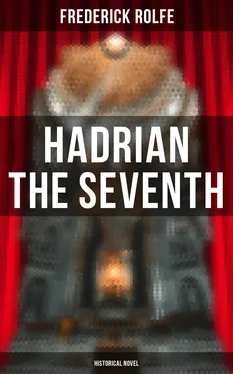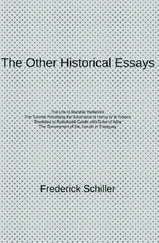Frederick Rolfe
Hadrian the Seventh (Historical Novel)

Books
OK Publishing, 2020
musaicumbooks@okpublishing.infoTous droits réservés.
EAN 4064066396053
Prooimion
Chapter 1
Chapter 2
Chapter 3
Chapter 4
Chapter 5
Chapter 6
Chapter 7
Chapter 8
Chapter 9
Chapter 10
Chapter 11
Chapter 12
Chapter 13
Chapter 14
Chapter 15
Chapter 16
Chapter 17
Chapter 18
Chapter 19
Chapter 20
Chapter 21
Chapter 22
Chapter 23
Chapter 24
To Mother
NEVE ME IMPEDIAS NEVE LONGIUS PERSEQUARIS
Oπως μήτε αντιστήσει μȯι μήτε ε ψει πορρωτέρω
In Obedience to the Decree of URBAN P.M. VIII, I declare that I have no Intention of attributing any other than a purely human Authority to the Miracles, Revelations, Favours, & particular Cases, recorded in this Book; & the same as regards the Titles of Saints & Blessed applied to Servants of GOD not yet cononized: except in those Cases which have been confirmed by the Holy Catholic Apostolic Roman See, of which I declare myself to be an obedient Son; & therefore I submit myself & all which I have written to her Judgement.
xxij Jul . 1904
FR. ROLFE
Table of Contents
In mind he was tired, worn out, by years of hope deferred, of loneliness, of unrewarded toil. In body he was almost prostrate by the pain of an arm on the tenth day of vaccination. Bodily pain stung him like a personal affront. "Some one will have to be made miserable for this," he once said during the throes of a toothache. He was no stranger to mental fatigue: but, when to that was added corporeal anguish, he came near collapse. His capacity for work was constricted: the mere sight of his writing materials filled him with disgust. But, because he had a horror of being discovered in a state of inaction, after breakfast he sat down as usual and tried to write. Dazed in a torrent of ideas, he painfully halted for words: stumbling in a maze of words, he frequently lost the thread of his argument: now and then, in sheer exhaustion, his pen remained immobile. He sat in a small low armchair which was covered with shabby brocade, dull-red and green. An old drawing-board, of the large size denominated Antiquarian, rested on his knees. The lower edge frayed the brocade on the arms of the chair. His little yellow cat Flavio lay asleep on the tilted board, nestling in the bend of his left elbow. That was the only living creature to whom he ever spoke with affection as well as with politeness. His left hand steadied his ms., the sheets of which were clipped together at the top by a metal clip. At the upper edge of the board a couple of Publishers' Dummies reposed, having the outward similitude of six-shilling novels: but he had filled their pages with his archaic handwriting. The first contained thoughts— not great thoughts, nor thoughts selected on any particular principle, but phrases and opinions such as Sophokles' denunciation, ’ Ω μιαρον ἠθος και γυναικος ύστερον, or Gabriele d'Annunzio's sentence
"Old legitimate monarchies are everywhere declining, and Demos stands ready to swallow them down its miry throat."
The second was his private dictionary which (as an artificer in verbal expression), he had compiled, taking Greek words from Liddell-and-Scott and Latin words from Andrews, enlarging his English vocabulary with such simple but pregnant formations as the adjective "hybrist" from ύβριστς , or the noun "gingilism" from gingilismus.
He was looking askance at his ms . In two hours, he had written no more than fourteen lines; and these were deformed by erasures of words and sentences, by substitutions and additions. He struck an upward line from left to right across the sheet: laid down his pen: lifted board, cat, books, and ms., from his knees; and laid them by. He could not work.
He poked the little fire burning in the corner of a fire-clayed grate. He was shivering: for, though March was going out like nine lions, he was very lightly clad in a blue linen suit such as is worn over all by engineers. He had an impish predilection for that garb since a cantankerous red-nosed prelate, anxious to sneer at unhaloed poverty, inanely had said that he looked like a Neapolitan. He brushed the accumulation of cigarette-ash from the front of his jacket and seized a pair of spring-dumb-bells: but at once returned them, warned by the pain of his left arm-pit. He took up the newspaper which he had brought with him after breakfast, and read again the news from Rome and the news of Russia. The former, he could see, was merely the kind of subterfuge which farthing journalists are wont to use when they are excluded from a view of facts. It said much, and signified nothing. "Our Special Correspondent" was being hoodwinked; and knew it: but did not like to confess it; and so indulged his imagination. Something was occurring in Rome: something mysterious was occurring in Rome. That could be deduced from the dispatch: but nothing more. The news of Russia was a tale of unparalleled ghastliness. It emanated from Berlin: no direct communication with Russia having taken place for a fortnight.
"How exquisitely horrible it is," he said to Flavio; "and I believe it's perfectly true. The Tzar,— well, that was to be expected. But the Tsaritza,— though, if ever a woman bore her fate in her face, she did, poor creature. Those dreadful haunted eyes of hers! That hard old young soft face! The innocent babies! How abominably cynically cruel! Yet there have been omens and portents of just such a tragedy as this any time these last few years. They must have known it was coming. Or is this another example of the onlookers seeing most of the game?" He fetched a book of newspaper cuttings, and turned the pages. "Here you are, Flavio," he said to the sleeping cat; "and here— and here. If these are not forewarnings— well!"
He sat down again, and studied certain paragraphs attentively.
EDUCATION BY THE KNOUT
PETERSBURG.— All Russia is in a state of unrest and seething with discontent. The very air is alive with the rumours of tumults on the one hand and of coups d'état on the other. The strangest stories are being bandied about as to what is taking place at Kiev, Sula, and all parts of the Empire, in fact, but especially in Moscow. There, it seems, while students and members of the higher classes are being thrown into prison by the hundred— not a few of them being packed off to Siberia— the workers are being treated with quite extraordinary consideration. They are even allowed to say their say and hold public meetings without let or hindrance, a thing unheard of in Russia. In Petersburg itself an ominous state of things prevails, and the city is completely in the hands of the police and the military. The streets are thronged with gensdarmes; even private houses are packed with soldiers; and never a week passes without some disorder arising or some public demonstration being made. In February a terrible scene occurred in the house of Nicholas II., a sort of People's Palace. In the course of a theatrical performance there some students threw down from the gallery into the body of the hall leaflets in which they demanded redress of their grievances. The place was crowded with law-abiding people for the most part; nevertheless the gensdarmerie who are always within hail, rushed in and simply trampled under foot all who came in their way.
Читать дальше













